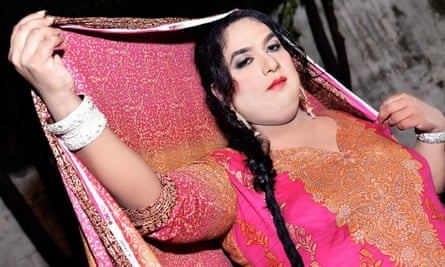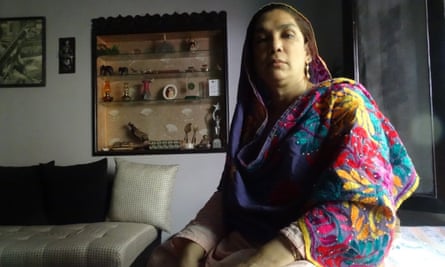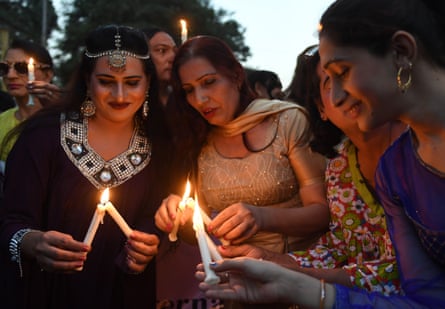Cast out, marginalised and even murdered, transgender people in Pakistan used to have to rely on their wits to survive. Now they are running for parliament.
The country is conservative and deeply religious and homosexuality is illegal, but it has nonetheless introduced laws that are at the global forefront of trans rights. Pakistan has officially recognised a third gender since 2009.
Laws were liberalised still further in March with a wide-ranging piece of legislation that grants intersex people, eunuchs and trans men and women the option to self-identify their gender on official forms. A person born male can now hold a female passport.
In contrast, the UK requires a citizen to be diagnosed with gender dysphoria and have lived for at least two years in their chosen gender.
The ruling means a lot to Zara. Kneeling on a mattress that takes up most of the floor of her concrete home, she reaches into a fake alligator-skin purse and pulls out a green identity card, and tears well up. On the card, Zara’s gender is marked as “X”.

“I was born with a very small male organ. Inside, my feelings are female,” the 35-year-old said. “I want to live like a woman, cook and do domestic work.
“Our appearance is different, so why should we have to have ‘male’ on our identity card?”
There are 13 trans candidates to choose from in Wednesday’s election. Nadeem Kashish, a 35-year-old transgender woman running for office in Islamabad, smokes a cigarette on the street below her makeup studio.
Banished from home, she entered the “guru” system, in which an elder khwaja sira houses younger trans people in return for a cut of their earnings as dancers or sex workers. She wants that system abolished, saying it is exploitative.
“When you see a transgender person, do not give them your notes, give them your votes,” Kashish advised listeners to her weekly radio show.
The trans community in Pakistan is divided between a young, international-leaning cohort who believe gender is fluid, and an older group who claim only those born with both female and male genitalia truly qualify.
Almas Boby, who launched the country’s trans rights movement by storming a police station in 2004 to call for the arrest of “dirty men”, argued that the law would merely encourage gay men to claim they were transgender in order to claim benefits.

“There were 10,000 khwaja siras counted in the census,” she said, referring to the official exercise conducted last year, thought by many to have recorded only a fraction of the community. “After this there will be millions, billions.”
One reason for the growing acceptance of the trans community springs from an unlikely source - Pakistan’s mullahs. The Council of Islamic Ideology, a government body that has deemed nine-year-old girls old enough to marry and approves the right of men to “lightly” beat their wives, has offered some support to trans rights.
Its chair, Dr Qibla Ayaz, noted a trans person, Heet, appears in the hadith – the sayings, actions and pronouncements of the prophet Muhammad.
In practice, Pakistani law forbids discrimination against trans people. It mandates vocational training and enshrines the right to run for political office.
Mehlab Jameel , a trans activist in Lahore, said: “Grassroots activists have worked so hard over the years to make this possible.” As a result, Pakistan has among the most progressive, inclusive and culturally sensitive legislation in the world, she added.
Quick GuideWhat is the Upside?
Show
Ever wondered why you feel so gloomy about the world - even at a time when humanity has never been this healthy and prosperous? Could it be because news is almost always grim, focusing on confrontation, disaster, antagonism and blame?
This series is an antidote, an attempt to show that there is plenty of hope, as our journalists scour the planet looking for pioneers, trailblazers, best practice, unsung heroes, ideas that work, ideas that might and innovations whose time might have come.
Readers can recommend other projects, people and progress that we should report on by contacting us at theupside@theguardian.com
Trans people have lived for centuries on the margins of society on the subcontinent. Many consider their sexual ambiguities to be God-given, meaning khwaja siras are sought out as intermediaries to the divine and are able to offer curses or blessings.
Wedding parties often hire khwaja siras to dance, and indeterminate gender is considered useful in areas where women are forbidden from leaving the house.
But trans people are typically cast out by their families, and many of the estimated 500,000 in the country end up as beggars or sex workers. Fifty-eight have been murdered in the past three years Khyber Pakhtunkhwa province alone.
Sceptics of the law note that Pakistan regularly fails to implement positive-sounding legislation. Many of the provisions require the involvement of the four provincial governments, none of which have passed its own version of the law or allocated any funding for trans issues this year.
That could mean the trans-specific shelters required by the legislation, for example, exist primarily on paper, said Qasim Iqbal of the trans charity Blue Veins.
Zara still hopes the law’s provision of “easy loan schemes” could revive her business selling mobile phones. Her long, auburn hair had become a familiar sight to traders at Aabpara market in Islamabad, but her previous lack of an ID card meant the shop she ran for 13 years was recently seized without notice by the landlord. She needs money to start up again.

The overall momentum leads Zara to picture a brighter future. “I want to wear women’s clothes all the time,” she said, her bland male outfit contrasting with pictures on the wall of her in bright, patterned dresses. “I’m hopeful that one day we will live that freely.”
This article is part of a series on possible solutions to some of the world’s most stubborn problems. What else should we cover? Email us at theupside@theguardian.com
